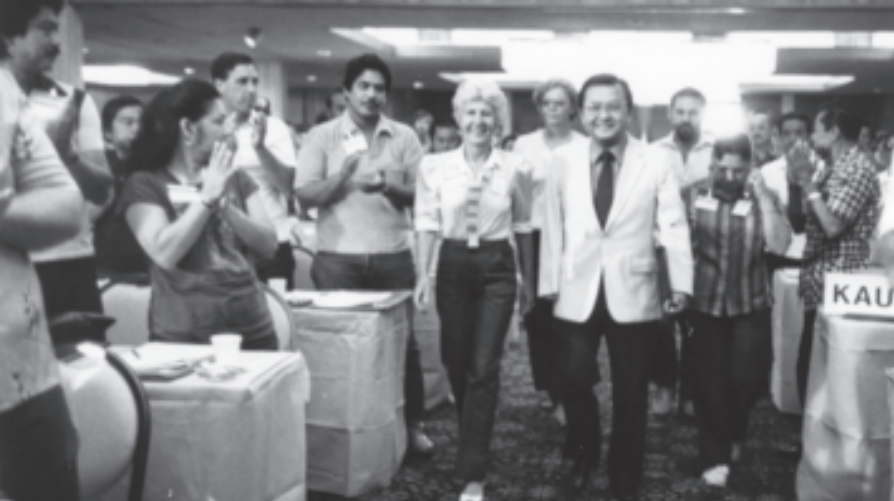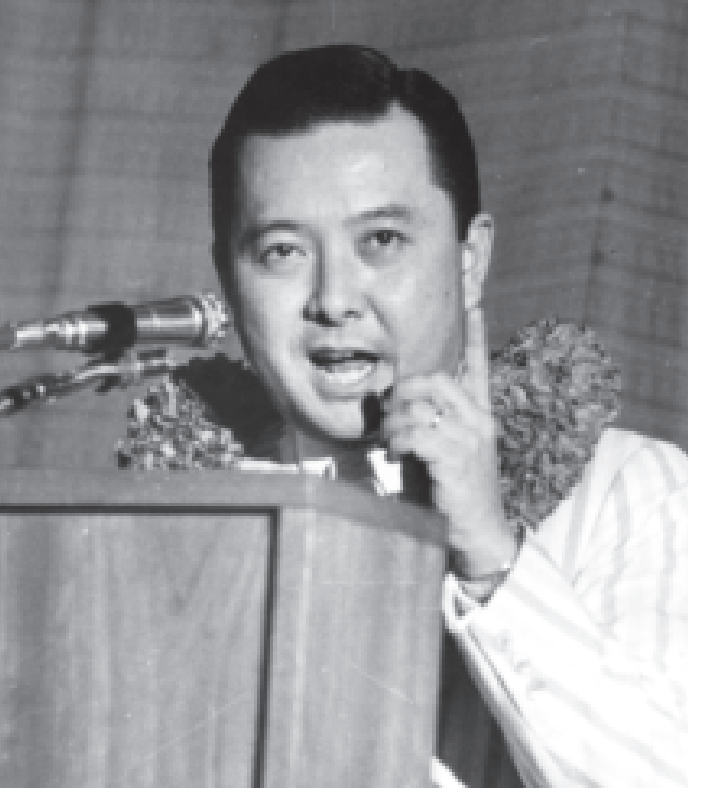A tribute to Hawaii’s greatest statesman

Daniel K. Inouye escorted by ILWU Sgt. At Arms at the 1983 Local Convention.
—Continued from page 6
We should continuously seek to promote an extended truce and demonstrate our sincere desire to bring this shooting war to an end as we pursue unrelentlessly our efforts to achieve a negotiated settlement to this conflict. I applauded the fact that we will not only honor the cease fire request but that we will use our influence to make certain the forces of the government of Saigon do likewise. However, I wish to encourage this administration to take another important step by informing Hanoi that we will not be the first to initiate a resumption in hostilities. We should assure Hanoi that we will extend the truce for as long as it is reasonably observed by them. To date we have always pursued the battle aggressively the minute the cease fire was scheduled to end.
We now have a change in the government in Hanoi. Despite the announced intention of that government to continue the policies of Ho Chi Minh we should pursue every opportunity toward a reduction in that conflict and toward a change, in the policy of their government. This is an opportunity we cannot afford to let pass and our message must be clearly transmitted not only to Hanoi but also to Saigon.
Both President Johnson and President Nixon have stated that there is no possible military solution to the war in Vietnam and yet the war continues and the killing, of our sons and the sons and daughters in South Vietnam goes on.
While we seek a solution, we should also seek to reduce the cost in life and suffering to the absolute minimum. Each death of an American boy is a loss which tugs at our conscience. That loss is particularly poignant when it serves to bring peace no nearer or when the end of his tour of duty is close at hand. Several weeks ago a small town in New Hampshire lost five of her sons in a single action within weeks of the time they were due to return home. While each life is precious, those which are expended in a conflict which we say cannot be won on the field of battle are particularly hard to bear. It is for this reason I called for a cease fire in June, or if that proved impossible at the very least maximum reduction in military action, while we seek a political settlement.
While we must strengthen the government of Saigon and transfer to them a greater share of the burden of providing for the security of their people this is not achieved by letting Thieu determine whether American soldiers shall fight and die or participate in a truce. We cannot permit his power to govern to be secured solely by American military power. It is time indeed long overdue that we forced the government of Thieu and Ky to act to increase their support from the people of South Vietnam for it is to the people we have made our commitment. It is therefore time that we forced the government in Saigon to take meaningful action to increase their capacity to govern.
It is time they took meaningful action on land reform, for to the Vietnamese common man, no single factor is more important than ownership of his land. We encouraged and assisted the two most successful land reform programs in Asia—in Japan and in Taiwan. We must do no less in Saigon if we are to develop stable and free institutions. It is also time that we forced an end to official corruption and governmentally condoned corruption. While this continues, the people will have no faith in their government— nor should they.
It is also time we insisted on freedom for the political prisoners being held by the government in Saigon. Free governments cannot develop under either the threat or actually of imprisonment for those who contest for public support through peaceful means. Our commitment is to their people- -and to ours. The time is overdue when that fact should be made clear to all. We have too long confused the trappings, the courtesies, and the ceremonies of authority with the realities of leadership. This can no longer continue.
We do not build a stable government in Saigon nor find peace in Paris by letting Thieu beat the drum to which American boys must march. We do not answer the charge in Hanoi or in Peiping, that Thieu is our puppet by our becoming his.
While unilateral withdrawal may not be an acceptable solution, the limited withdrawal of American troops must continue. This can occur only as we pursue every opportunity for a reduction in the scale of the fighting and every chance at a cease fire or truce. Our policy must be clear and it must be consistent.
We want out of Vietnam. We should continue a planned and phased combat troop withdrawal.
We should and must not seek to impose a military solution on the political problem of Vietnam. The South Vietnamese government must prove its capacity to govern. They cannot rely on our military might as a substitute for their need for political support from their own people. We want the fighting to end—the shooting to stop and we shall pursue every opportunity to clearly demonstrate that fact.
The problems of Vietnam will be solved neither by public relations gimmicks nor rhetoric. Neither will it respond to wishful thinking. It won’t just go away. Vietnam has been a tragic experience. That tragedy must not be further compounded.
2006 ILWU Local 142 Convention, Sept. 25-29
t has been my high honor to stand with the working men and women of the ILWU over these many years. The sugar and pineapple workers, the hotel employees and the longshore workers in the docks. While some things have changed over time, still others have remained the same. The importance of mutual respect between labor and management and ensuring living wage and adequate benefits to support a family. These basic fundamental principles must not be eroded. Please count on me to help level the playing field where necessary and to advocate on your behalf.
2009 ILWU Local 142 Convention, Sept. 15-18
Aloha. I regret that I’m unable to be with you personally, but my Senate legislative responsibilities are keeping me in Washington.
First and foremost, I wish to commend the 22,000 members of your hard work on the docks, in hospitals, in the hotels, and agricultural fields. As the largest private labor union, your workforce touches every community in Hawaii economically, socially, and politically. I hope you stand together in support of our public-sector labor brothers and sisters as they persevere through their tumultuous and trying negotiations. Our solidarity must remain our strength.
As chairman of the Senate Appropriations Committee, I am committed to stopping the economic bleeding and create a measure of stability. The first crucial step was the passage of the American Recovery and Reinvestment Act in a record 42 days. Through it all, I always had one eye clearly focused on Hawaii, to be sure that we at least got our fair share. And we’re positioned for it, to take advantage of the long-term technology and clean energy investments.
The Senate just passed the Travel Promotion Act which will create a public/private partnership to invest in our nation’s tourism industry by attracting new international visitors and creating new job opportunities.
I championed this measure because when I chaired the Congress committee, I am very pleased that it will become law soon to support Hawaii’s primary industry.
I would be remiss if I did not touch briefly upon the health care reform debate. The overall goal is to reduce soaring cost of health, and to insure that every American get affordable health insurance for themselves and their families. There is general agreement that the current system is broken; and if not fixed, it will implode. There is also agreement that there should be greater controls on health insurance companies. And most have health insurance generally like their coverage and do not want to change, that’s fine. There should be choice and should be competition.
The debate and discussion will continue in earnest. Solutions run the spectrum. There is no consensus yet on either the reforms or how to pay for the reforms. But I do agree with President Obama that comprehensive health care reform is a necessary component to the long-term economic recovery of our nation.
But to be safe, your congressional delegation has included a provision to exempt the Hawaii Prepaid Health Care Act unless the national reform ultimately surpasses what we already offer in Hawaii. In many ways we are, and have been, the national model for decades.
I remain optimistic, when working together, we’ll be able to ride out this economic storm, returning stability and confidence in the marketplace and restoring hope at home. Aloha.
2012 ILWU Local 142 Convention, Sept. 19
Before the ILWU formed in Hawaii, in 1937, workers were organized by trade or by ethnic background. They had very little leverage with the powerful private companies that controlled their professional lives. The creation of the ILWU in Hawaii began on the docks, but it quickly spread to include sugar and pineapple plantations, the hospitality industry and the general trades, including construction, supermarkets, hotels, and newspapers. No longer were the companies able to arbitrarily dictate working conditions to their employees. A measure of fairness and accountability was injected into the workplace, and the union title helped raise the prospects of a democratic consigning in Hawaii.
Your members have always been there for me. And for your decades of support and counsel, I extend my thanks and deep appreciation.

